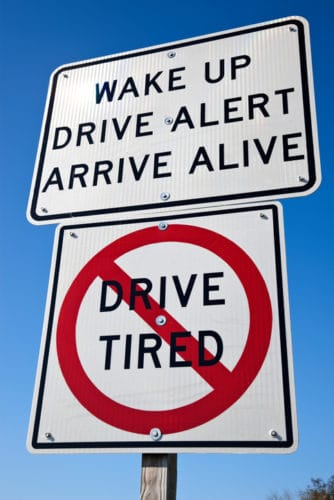Sleep deprivation increases the risk of a serious accident.

If you’re like many Americans, sleep deprivation is a way of life. From new parents to students up late studying for an exam to people who suffer from anxiety or insomnia, most Americans suffer from too little sleep at some point in their lives. While taking a short nap or sleeping in on the weekend can help in the short-term, if you suffer from chronic sleep deprivation, even these steps are not enough to recover from a massive sleep deficit. In these cases, you may simply be too tired to drive.
As auto accident attorneys, we see many cases of serious injuries resulting from overly tired drivers. These types of accidents can even be fatal. According to a 2014 report from the American Automobile Association (better known as AAA), one in five fatal motor vehicle accidents involve a sleep-deprived driver. That is why it is so important to recognize the effects of sleep deprivation on your ability to drive.
How Lack of Sleep Impacts Your Ability to Drive
Even a few hours of missed sleep can have repercussions on your ability to drive. The effects of sleep deprivation can be similar to intoxication. Being overly tired can make it hard for a driver to pay attention, remain vigilant, react quickly and make smart decisions.
It isn’t an exaggeration to say that excessive sleep deprivation can be the equivalent of driving drunk. If you’re really tired, you may even fall asleep behind the wheel! Some drivers even experience what is known as microsleep — dozing off for just a few moments — without even realizing that they are doing it.
Despite the dangers of driving while exhausted and the somewhat obvious signs that a person is simply too tired to drive, many people ignore the risk of driving while sleep deprived. They often believe that drinking coffee, soda or energy drinks will fix the problem, or that they can just drive with the windows down. While these things can help, each is just a temporary fix. If you need to guzzle a Red Bull to stay alert, you should probably not be on the road at all.
What You Can Do
If you’re feeling exhausted, the best decision is to not drive. Pay attention to how you feel, both physically and mentally, and listen to what your body is telling you. If you’re on a long-distance drive, pull over to a rest stop or book a hotel room to catch a few hours of sleep. If possible, delay your trip until you can get enough sleep to drive safely. For shorter trips, see if someone else can drive, or if you can put off the drive until you are well-rested. It is far better to be late or to delay a trip than to hurt yourself or another person by driving while sleep-deprived.
You should also examine your sleep habits. Are you getting at least seven hours of quality sleep each night? If not, consider talking to a doctor about your sleep issues. There may be a simple solution to help you get better sleep and reduce the risk of causing an accident behind the wheel.
Most importantly, use common sense every time you get behind the wheel. If your driving is impaired in any way — from lack of sleep, drugs, alcohol, or anything else — do not drive. Auto accident attorneys see the results of impaired driving every single day — you do not want to be the cause of a serious accident that could kill or injure another person.
On the other hand, if you’ve been hurt in an accident caused by a driver who was too tired to drive, you will need a tough, smart auto accident attorney who can litigate or negotiate a settlement to compensate you for your losses. Contact the Law Offices of Larry H. Parker today at 800-333-0000 or info@larryhparker.com to learn more about how we will fight for you. We offer free initial consultations, and we never charge a fee unless we get money for you!



